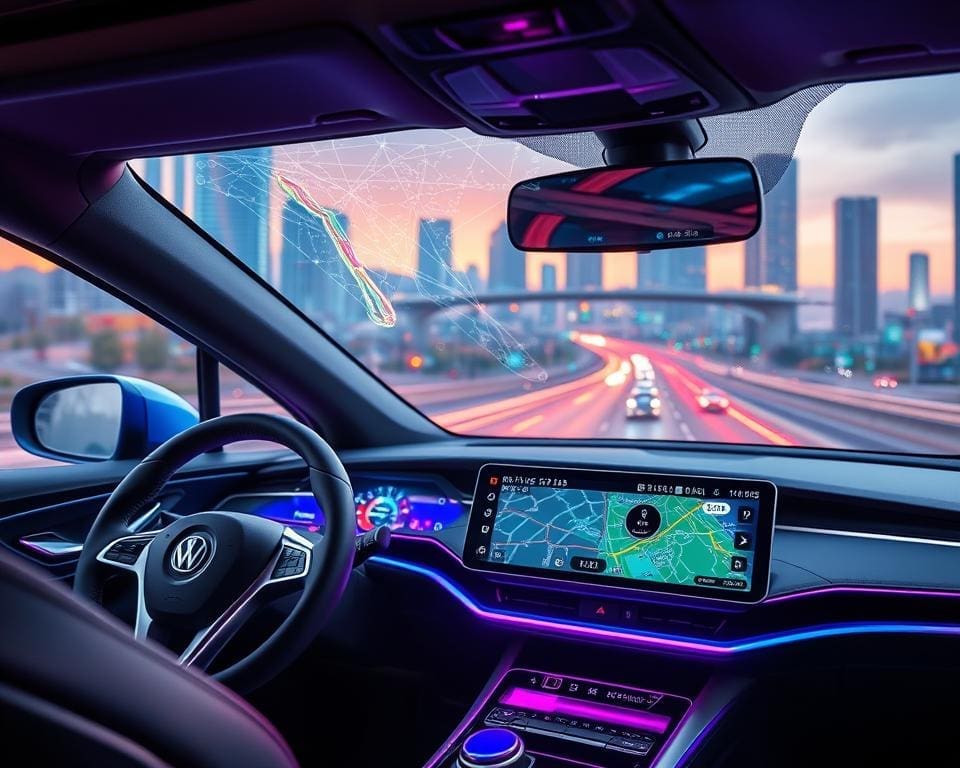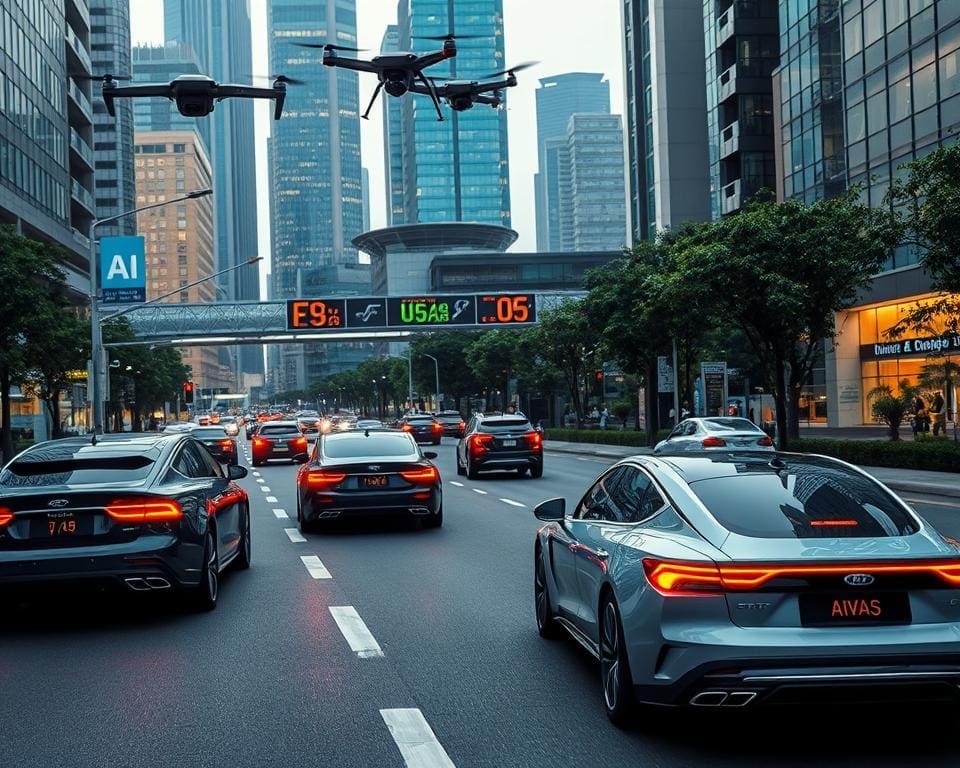In today’s rapidly evolving automotive landscape, AI Navigation stands at the forefront of innovation, transforming the way we perceive smart cars. This sophisticated technology seamlessly integrates artificial intelligence within navigation systems, enabling vehicles to not only reach their destinations but also to optimise routes with unparalleled efficiency. The emergence of intelligent routing is revolutionising the driving experience, providing drivers with real-time data and enhancing safety substantially.
With the growing interest in autonomous driving, AI Navigation is not merely a luxury but a necessity for the future of mobility. As we delve deeper into this realm, we will explore how these advancements are shaping our journeys, making every ride not just a trip, but a smarter experience.
The Evolution of Navigation Technology
The transformation of navigation technology has reshaped how individuals and businesses approach travel and logistics. This journey from conventional approaches to cutting-edge AI systems represents not only a shift in tools but also a leap in accuracy and user experience. Understanding these pivotal changes offers insight into the current landscape of vehicle navigation systems.
From Conventional Maps to AI Systems
Historically, navigation relied heavily on paper maps, which provided vital information but lacked the dynamic qualities of modern mapping solutions. The advent of the Global Positioning System (GPS) in the 1990s marked a significant turning point. It introduced precise geolocation capabilities that revolutionised the way individuals navigated their journeys. As technology continued to advance, the emergence of smartphone applications provided a more accessible interface for navigation. Popular apps like Google Maps and Waze made real-time adjustments and traffic data available, enhancing the effectiveness of vehicle navigation systems.
Milestones in Vehicle Navigation Systems
Key milestones significantly contributed to the evolution of navigation technology. The incorporation of real-time traffic data has allowed drivers to avoid congested routes, significantly improving travel efficiency. Innovations such as voice-guided directions and predictive routing have reshaped user interactions with vehicle navigation systems. As a result, the integration of AI-driven solutions has provided a platform for more intuitive and user-friendly navigation, highlighting an ongoing commitment to enhancing the driving experience.

Understanding AI Navigation
AI Navigation represents a significant advancement in the way we approach driving and route planning. This technology harnesses the power of Machine Learning to transform traditional navigation systems into intelligent tools that adapt to individual needs. This evolution not only optimises routes but also enhances the overall travel experience.
The Role of Machine Learning in Navigation
Machine Learning algorithms play a crucial role in the functionality of AI Navigation systems. By analysing vast amounts of data, these algorithms can:
- Optimise routes in real-time based on current traffic conditions.
- Predict potential delays by learning from historical data.
- Adapt to personal driving patterns, providing tailored recommendations.
This ability to learn and adjust dynamically sets AI Navigation apart from conventional systems, offering drivers a more intuitive experience as they navigate their journeys.
Key Features of AI Navigation Systems
AI Navigation systems boast several features that enhance their usability and efficiency. Key features include:
- Adaptive Routing: Automatically reroutes based on real-time traffic updates.
- Voice Recognition: Allows hands-free operation for safer driving.
- Predictive Analytics: Anticipates user needs by recognising patterns in behaviour.
These innovative attributes not only make driving more efficient but also create a personalised experience that ensures each journey is optimised for the user’s preferences.
AI Navigation: Making Cars Smarter on Every Route
AI Navigation stands at the forefront of transforming Smart Cars into sophisticated vehicles capable of navigating with unprecedented precision. By integrating various data sources such as GPS, real-time traffic updates, and onboard sensors, this innovative system delivers real-time feedback to optimise journeys.
Intelligent Routing plays a pivotal role in the functionality of AI Navigation. It empowers drivers to avoid congested areas and hazardous zones, thereby enhancing their overall travel experience. This dynamism contributes not only to increased fuel efficiency but also significantly reduces travel times, making every journey more enjoyable.
The harmony between AI Navigation and mobile device integration serves to further elevate the driving experience. Features like seamless navigation prompts and timely updates ensure that drivers can focus fully on the road while staying informed. As a result, the convergence of technology creates a safer and more enjoyable avenue for exploring the open road.
The Impact of Intelligent Routing
Intelligent routing revolutionises how we perceive travel, transforming everyday journeys into seamless experiences. Thanks to AI Navigation, vehicles can now analyse real-time data and historical traffic patterns, which enhances travel efficiency significantly. This capability allows drivers to navigate smarter and save precious time on the road.
Enhancing Travel Efficiency
Automated systems within AI Navigation offer unparalleled insights into the best pathways. By evaluating multiple variables such as traffic volume, road conditions, and even weather patterns, these systems can suggest alternate routes that minimise delays. Studies have shown that vehicles equipped with intelligent routing capabilities can cut travel time by up to 30% during peak hours.
Reducing Traffic Congestion
Urban areas often suffer from severe traffic congestion, but the integration of intelligent routing can remedy this issue. With precise traffic predictions, AI Navigation systems identify bottlenecks well in advance. This proactive approach enables rerouting before congestion occurs, therefore smoothing the flow of vehicles. Cities that have implemented such AI technologies have reported a decrease in traffic congestion by nearly 20%, showcasing their potential in creating a more efficient transportation network.
The Integration of Advanced Driver Assistance Systems (ADAS)
The synergy between AI Navigation and Advanced Driver Assistance Systems (ADAS) promises to transform road safety significantly. Both technologies work in harmony to deliver an unparalleled driving experience that prioritises safety and efficiency. By utilising advanced algorithms and real-time data, these systems provide a foundation for safer travel.
AI Navigation’s Role in Safety
AI Navigation plays a pivotal role in enhancing the safety features of vehicles. It provides essential data analysis that allows systems like lane keeping assistance and automatic emergency braking to function accurately. Through precise navigation, these features can predict potential hazards and respond promptly, which helps to avert accidents. The integration of AI Navigation into these safety mechanisms facilitates better situational awareness, allowing drivers to focus more on the road.
Connecting AI Navigation with ADAS
The connection between AI Navigation and Advanced Driver Assistance Systems (ADAS) is integral for developing smarter vehicles. This partnership enhances features such as adaptive cruise control, which adjusts speed according to traffic conditions, ensuring a smoother and safer journey. Through real-time alerts and ongoing support for drivers, the combination of these technologies aids in reducing risks and improving overall driving safety.
The Future of Smart Cars
The landscape of smart cars is on the verge of a remarkable transformation. With innovations in technology and societal demands for safer, more efficient transport, the predictions surrounding autonomous driving and connected cars are becoming increasingly optimistic. As we venture into this future, it becomes evident that advancements in AI Navigation will play a pivotal role in shaping the driving experience.
Predictions for Autonomous Driving
Autonomous driving technology has progressed significantly in recent years. Experts foresee a future where vehicles operate independently, navigating complex traffic systems without human intervention. This seamless interaction will rely heavily on AI Navigation systems, which will process vast amounts of data, enabling real-time decision-making. The potential of fully autonomous vehicles could not only enhance safety but also revolutionise daily commutes by providing a more relaxed driving experience.
The Shift Towards Fully Connected Cars
Connected cars are set to redefine mobility by fostering communication among vehicles, as well as between cars and infrastructure. This interconnectivity allows for improved traffic flow and increased safety measures, as cars share vital information such as road conditions and potential hazards. AI will underpin this transformation, providing the necessary insights to create a smart ecosystem that enhances the efficiency of urban mobility. As cities adapt to these innovations, the role of connected cars in reshaping transportation cannot be underestimated.
Challenges and Considerations in AI Navigation
The journey towards a future dominated by AI Navigation is not without its obstacles. One of the primary challenges lies in data privacy. As smart cars collect extensive information to improve routing and driving decisions, they also risk compromising personal data. This concern calls for rigorous data protection measures to uphold consumer trust and comply with regulations.
Another significant challenge in smart cars is the reliance on connectivity. AI Navigation systems depend on constant data exchange with the cloud and other devices. Disruptions in connectivity, whether due to poor signal or technical failures, could lead to potential hazards. Ensuring robust back-up systems and offline capabilities is crucial to mitigate these risks.
Furthermore, the impact of AI decision-making in critical situations must be handled with care. Developing clear regulations surrounding AI technologies in vehicles is essential to guarantee safety and reliability. Continuous research and technological advancements are necessary to address these challenges, unlocking the full potential of AI Navigation and enhancing the overall driving experience for all. Only by tackling these issues can we confidently embrace the future of smart cars.









